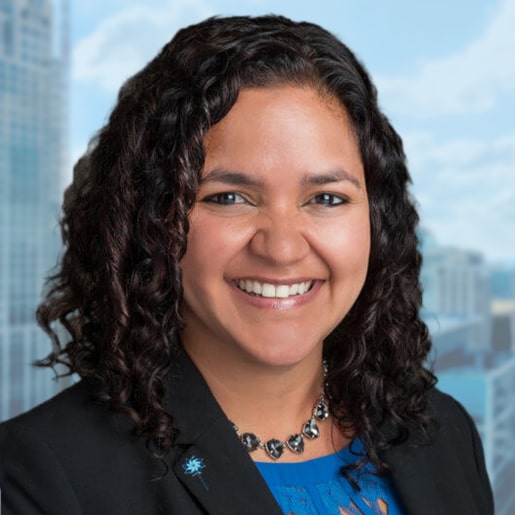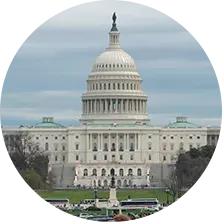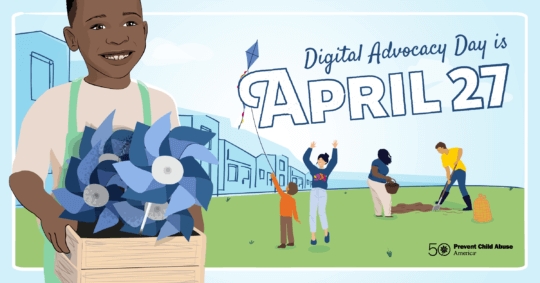2022 Digital Advocacy Day
Wednesday, April 27, 2022 is Prevent Child Abuse America’s third annual Digital Advocacy Day, and we need your help! Every child is filled with tremendous promise, and we have a shared duty to foster their potential. That means shoring up the ways we support families.
Join us and our partners nationwide in contacting your lawmakers and urge them to act now to reauthorize the bipartisan Maternal, Infant, and Early Childhood Home Visiting (MIECHV) program and to increase funding for this important program.
On Digital Day of Advocacy — April 27, 2022 — reach out to your member of Congress about the critical role of evidence-based home visiting programs, like Healthy Families America, and its positive impact on families and children.
Specifically, we’re requesting that Congress:
- Increase MIECHV funding over the next five years to reach more families and better support the workforce
- Double the tribal set-aside within MIECHV from 3% to 6%
- Continue to allow virtual home visiting with model fidelity as an option for service delivery.
This crucial investment in American families will support resources at the state and community level that mitigate the challenges and stressors on parents.
Your members of Congress need to hear from you! We have the extraordinary opportunity to educate lawmakers about evidence-based home visiting programs, like Healthy Families America, and its positive impact on families and children. Get involved by emailing, tweeting, posting on social media, and/or calling your senators and representatives.
Below are materials and guidance that can help you in your outreach efforts. Please contact the PCA America Policy Team at pcaapolicyteam@preventchildabuse.org for additional support!
The Maternal, Infant, and Early Childhood Home Visiting (MIECHV) program is a federal grant to states, territories and Tribes that supports evidence-based home visiting for families and children from prenatal period through kindergarten entry. The law that authorizes MIECHV will expire in September 2022.
MIECHV supports critical work to develop and implement voluntary, evidence-based home visiting programs, including Healthy Families America. While the program’s ability to impact maternal and child health outcomes is clear, years of level funding limit its reach to vulnerable families. Of the 18 million current and expectant parents who could benefit from MIECHV, only 150,000 currently benefit from the program. To bring the power of home visiting to more families and promote improved maternal health outcomes, we need Congress to invest in MIECHV.
Prevent Child Abuse America, as a member of the Steering Committee of the National Home Visiting Coalition, is working in partnership with other evidence-based home visiting models and national, state, and local organizations to ensure a timely and robust reauthorization of MIECHV. The Coalition has set the following priorities:
- Increase MIECHV funding over the next 5 years to reach more families and better support the workforce
- Double the tribal set-aside within MIECHV from 3% to 6%
- Continue to allow virtual home visiting with model fidelity as an option for service delivery
- The Maternal, Infant, and Early Childhood Home Visiting (MIECHV) program is a federal grant to states, territories and Tribes that supports evidence-based home visiting for families and children from prenatal period through kindergarten entry. The law that authorizes MIECHV will expire in September 2022.
- Home visiting programs are a prevention strategy used to support pregnant moms and new parents as they work through the challenges of raising babies and young children.
- Home visiting programs help new and expectant parents develop the skills and confidence it takes to raise healthy families.
- Home visiting prevents adversity and builds resilience by being there during a child’s most critical years of development (prenatal to age five).
- Evidence-based home visiting programs, such as Healthy Families America, prevent and reduce the recurrence of child maltreatment, promote healthy child development, and enhance family well-being. Among many other positive outcomes, families who participate in HFA and other home visiting programs have shown reductions in the number of low-birthweight babies, improved school readiness for children, and increased economic self-sufficiency.
- For nearly 30 years, HFA has worked toward a singular vision: all children receive nurturing care from their family that leads to a healthy, long, and successful life. All families can benefit from support during pregnancy and throughout early childhood owing to the enormous life transitions and rapid growth occurring during this time.
- HFA serves nearly 70,000 families across the United States each year, with nearly 600 sites in 38 states, the District of Columbia, and five US territories. Approximately 30% of HFA families served are supported through MIECHV funding.
- Local implementation of HFA is funded through a variety of mechanisms, including federal funds such as MIECHV, state funds (including Medicaid and TANF) and local and private funding.
- Invest in our children’s future, reauthorize home visiting #MIECHV funding. Make #GreatChildhoods happen all year long! @PCAAmerica @HFAatPCA
- Today, April 27th, is our third annual Digital Advocacy Day. You can help us grow online word-of-mouth and show your support for policies and programs that support all children and families with a few simple steps. Learn more: https://bit.ly/3IS3aj7 #GrowingBetterTogether
Digital Advocacy Day is April 27th. Use the resources on this page to contact your elected officials and spread the word about policy changes that’s vital to the well-being of children and their families.
The law that authorizes MIECHV will expire in September 2022. The House and Senate committees with jurisdiction over MIECHV will begin to hold hearings in the spring and into the summer in preparation for the reauthorization of MIECHV.
Advocacy or Education is public support for or recommendation of a particular cause or policy. Lobbying is seeking to influence (a politician or public official) on an issue or a specific ask such as supporting la piece of legislation.
There are many avenues of advocacy that nonprofits can engage in that do not constitute lobbying. Advocacy happens in many different ways, but at its core it’s about raising awareness, building and leveraging relationships, and educating others around the issues and policies that matter to you. There are varying degrees in which an HFA site, PCA chapter, or nonprofit organization, can engage in advocacy that do not cross into lobbying. Advocacy can include such activities as:
- Educating and informing lawmakers
- Helping to shape state laws and budgets
- Making your voice(s) heard about important issues that affect our daily lives
- Helping policymakers find solutions to problems
- Providing critical information for adoption or rejection of introduced legislation
- Urging the public to contact policy makers to advocate for adoption or rejection of legislation
On the other end of the spectrum are lobbying activities. Key lobbying activities include activities in direct support or opposition to a specific piece of proposed legislation. While nonprofits can engage in some lobbying, the IRS has strict rules regarding the percentage of a nonprofit’s budget that can go toward lobbying activities. It’s recommended that any agency follow the rules and guidelines as set around lobbying and advocacy when engaging with lawmaker
If you have any questions or concerns, please contact the PCA America policy team at pcaapolicyteam@preventchildabuse.org.
The Maternal, Infant, and Early Childhood Home Visiting (MIECHV) program is a federal grant to states, territories and Tribes that supports evidence-based home visiting for families and children from prenatal period through kindergarten entry. The law that authorizes MIECHV will expire in September 2022.
MIECHV supports critical work to develop and implement voluntary, evidence-based home visiting programs, including Healthy Families America. While the program’s ability to impact maternal and child health outcomes is clear, years of level funding limit its reach to vulnerable families. Of the 18 million current and expectant parents who could benefit from MIECHV, only 150,000 currently benefit from the program. To bring the power of home visiting to more families and promote improved maternal health outcomes, we need Congress to invest in MIECHV.
Prevent Child Abuse America, as a member of the Steering Committee of the National Home Visiting Coalition, is working in partnership with other evidence-based home visiting models and national, state, and local organizations to ensure a timely and robust reauthorization of MIECHV. The Coalition has set the following priorities:
- Increase MIECHV funding over the next 5 years to reach more families and better support the workforce
- Double the tribal set-aside within MIECHV from 3% to 6%
- Continue to allow virtual home visiting with model fidelity as an option for service delivery




